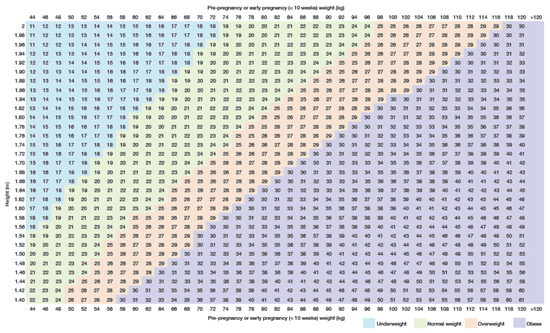Healthy weight gain during pregnancy

Pregnancy is a time of changes within the body. It is normal to gain some weight during pregnancy due to the growth of the baby, placenta, and fluid around the baby (amniotic fluid).

- However, too much extra weight during pregnancy can increase your chances of:
- high blood pressure with complications in pregnancy (pre-eclampsia)
- diabetes during pregnancy (gestational diabetes)
- needing a cesarean section
- having a large baby. This increases their risk of becoming obese in childhood and early adult life
- difficulty losing weight after your baby is born. This may increase your risk of developing diabetes, heart disease, and some cancers later in life.
- Not gaining enough weight during pregnancy can increase the chances of having a premature (preterm) birth, or a small for age baby.
How much weight should I gain?
The amount of weight that you should gain during pregnancy depends on your pre-pregnancy body mass index (BMI). This is your weight (measured) in kilograms divided by your height (measured) in meters squared. You can ask your health practitioner to help you with this, especially if you do not have accurate scales at home.
For example: if you are 1.68 m tall and weigh 82 kg:

Your BMI = = 29 kg/m2 = Overweight category (orange colour)
We made it easy by the below tool to know the appropriate weight gain during pregnancy.
Alternatively, you can use the chart below to help you. Find your height, then go across the chart till you are in the column headed by your weight (kg). The number in the cell is your BMI (rounded to the nearest whole number). The color of the cell indicates which recommendations are right for you.
BMI chart

Source: health.govt.nz
In the first trimester (first 12 weeks), most women do not need to gain much weight (usually less than 2 kg) – which is just as well for those who have morning sickness early in pregnancy. Some women even lose a small amount of weight. If this happens to you, you do not need to be concerned as long as you start to gain weight steadily in the second and third trimesters of your pregnancy.
The table below can be used as a guide to help you work out how much weight you should gain during your pregnancy. Regardless of your BMI at the start of pregnancy, you can still have a healthy weight gain during pregnancy.
Most women do not gain much weight during the first trimester of pregnancy (between half and 2 kilograms). The rate of weight gain can vary during the rest of your pregnancy and may not be the same every week.
Recommendations for total weight gain during pregnancy, by pre-pregnancy or early pregnancy (less than 10 weeks) BMI
| Pre-pregnancy or early pregnancy (less than 10 weeks) BMI (kg/m2) | Total weight gain range |
|---|---|
| Underweight (<18.5) | 12.5 kg–18 kg |
| Healthy weight (18.5 – 24.9) | 11.5 kg–16 kg |
| Overweight (25.0 – 29.9) | 7 kg–11.5 kg |
| Obese (≥ 30.0) | 5 kg–9 kg |
Source: IOM and NRC 2009
If you’re having twins
It is especially important to gain the right amount of weight when you’re expecting twins because your weight affects the babies’ weight. And because twins are often born before the due date, higher birth weight is important for their health. It is important you work with your health care provider to determine what’s right for you.
Consider these general guidelines for pregnancy weight gain if you’re carrying twins:
| Pre-pregnancy or early pregnancy BMI (kg/m2) | Recommended weight gain |
|---|---|
| Healthy weight (BMI 18.5 to 24.9) | 17 kg–25 kg |
| Overweight (BMI 25 to 29.9) | 14 kg–23 kg |
| Obese (BMI 30 or more) | 11 kg–19 kg |
Source: IOM and NRC 2009
Where does the extra weight in pregnancy go?
Pregnancy is a unique time in which your body changes to meet the needs of your growing baby. Your body must store nutrients and increase the amount of blood and other fluids it makes.
Here is an example of how much each component part weighs during pregnancy if your baby’s birth weight is 3.5 kg, and you gained 12.8 kg during your pregnancy:
| Baby | 3.5 kg |
|---|---|
| Fluid around the baby (Amniotic fluid) | 0.9 kg |
| Placenta | 0.7 kg |
| Growth of your womb (uterus) | 0.9 kg |
| Growth of your breasts | 1.1 kg |
| Increased amount of blood | 1.5 kg |
| Increased amount of other body fluids | 1.1 kg |
| Storing of nutrients (fat and protein) | 3.1 kg |
| Total weight gain based on this example | 12.8 kg |
Is it safe to lose weight when pregnant?
Dieting to lose weight during pregnancy is not recommended.
Managing your weight gain
While it is ideal to be a healthy weight before becoming pregnant (ie, a BMI between 18.5 and 24.9), we know that this doesn’t always happen! If you are outside the healthy weight range, you can still help your baby by gaining weight within the recommended range for your BMI category.
Talk to your lead maternity carer about how you can monitor your weight, and for advice about eating and being active during your pregnancy.
Healthy weight gain tips for healthy women
Here are some tips to help you manage healthy weight gain during pregnancy.
- Pregnancy is not about ‘eating for two’. In the first 12 weeks of pregnancy, you can eat the same amount as you usually would. It is important you eat healthy food.
- After the 12th week, and if you are a healthy weight, the extra food you need each day is about the same as a wholegrain cheese and tomato sandwich, or a wholegrain peanut butter sandwich and a banana. If you are overweight or obese, the extra food you need is about the same as 1 slice of wholegrain bread or 2 apples.
- Drink water rather than sweetened drinks or fizzy drinks.
- Drink low-fat [trim (green top) or calcium-extra (yellow top)] or light blue milk instead of full-fat (blue or silver top) milk.
- Choose wholegrain bread instead of white bread.
- Eat a healthy breakfast every day, such as wheat biscuits or porridge with low-fat milk, or 2 slices of wholegrain toast.
- Have at least 4 servings of vegetables and 2 servings of fruit every day. Buy vegetables and fruits that are in season, or buy frozen vegetables to help reduce cost, wastage and preparation time. Tinned fruit in the juice are also a good option.
- Examples of a vegetable or fruit serving:
- half a cup of peas, broccoli or carrots
- 1 medium-sized potato, banana, orange or apple
- 1 large kiwifruit.
- If vegetable/fruit juice or dried fruit is consumed, it contributes a maximum of only 1 serving of the total recommended number of daily servings for fruit/vegetables.
- Examples of a vegetable or fruit serving:
- Prepare and eat meals at home. Have takeaways no more than once a week.
- Choose healthy snacks such as unsweetened or low-sugar, low-fat yogurt, fruit, cheese and crackers, home-made popcorn, a glass of trim milk, a few unsalted nuts (eg, 6 or 7 almonds) or a small wholegrain sandwich.
- Aim to do at least 30 minutes of moderate-intensity activity 5 or more days a week, eg, brisk walking or swimming (or as advised by your doctor, midwife or physiotherapist). The ‘talk test’ is a simple way to estimate intensity: as a guide, you should be able to carry out a conversation but not sing while doing moderate-intensity activity.
(The Ministry of Health acknowledges the work of E Jeffs and Canterbury DHB in producing these tips.)
Returning to pre-pregnancy weight
Gaining the right amount of weight during pregnancy through a mixture of good eating and activity choices will make returning to your pre-pregnancy weight easier.
If you were overweight or obese before becoming pregnant but established good eating and activity habits during pregnancy, continuing to do so after your baby is born will help support gradual weight loss. This will not adversely affect the ability to breastfeed or the quantity or quality of your breast milk.
The greatest amount of weight loss usually occurs in the first 3 months after birth and then continues at a slow and steady rate until 6 months after birth. Breastfeeding helps you return to your pre-pregnancy weight as some of the weight you gain during pregnancy is used as fuel to make breast milk.
Future pregnancies
If you are planning another pregnancy, it is a good idea to establish healthy eating and activity patterns and try to reach a healthy weight before becoming pregnant. For some, this will be a matter of returning to your pre-pregnancy weight or close to it.
Retaining excess weight over subsequent pregnancies increases your risk of developing diabetes and heart disease later in life.
Speak to your lead maternity carer for more advice.
Don’t forget to take an 800 mcg tablet of folic acid each day if you are trying to become pregnant!
Source: Dept of Health, NZ
Comments
This article is a source of inspiration, I recommend it.
I also want to share how I lost weight fast and healthy, can help someone:
https://bit.ly/31kWp5g
Thanks and keep it up!
Feel free to surf to my page – Patience Stefanick
















Leave a comment